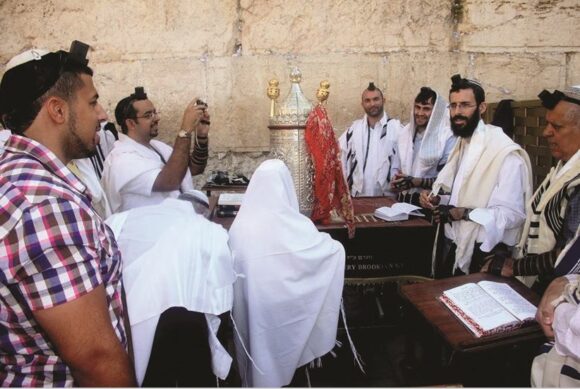DO YOU KNOW what the Ten Commandments are? You may well have heard of them, but do you know where they came from, and how many of them could you name? It’s worth a Iittle Bible research to find the answers to these questions.
The people of Israel had escaped Egypt, crossed the Red Sea, and survived three months in the desert. They were on their way to the Promised Land. They now came to a mountain range well known to Moses from his shepherding days in the Sinai Peninsula. However, the hills would be awe-inspiring to the rest of the people, who had grown up in the pancake-flat, green triangle of the Nile delta.
Moses knew that this particular mountain before which they were now pitched was a special place. There, only months before, he had removed his shoes in the presence of the angel of God. He had been promised that after delivering His people, he would bring them to worship God at Sinai (Exodus 3:12). This he had now accomplished.
But there was more to this rendezvous with God than a religious festival. God was going to enter into a very solemn agreement with His people. For two days, He kept them waiting. On the third morning, the purple flanks and soaring precipices of the great peak were wrapped in heavy cloud, and a tremendous thunderstorm broke over the mountain. The ground beneath the assembled Israelites shook convulsively, as if it, too, were afraid at the presence of God. Then, clear, silvery, and deafeningly loud, a mighty trumpet note rang out over the storm. Standing there, exposed and terrified, the people heard in awe-inspiring tones the voice of the angel of God reciting, for the first time, the Ten Commandments (Exodus 20).
That was only the beginning. Moses himself climbed the mountain into the dark cloud, to be given many more commandments. They occupy three whole chapters of Exodus (21, 22 and 23), and cover all aspects of daily Iiving, from the punishment for theft to the importance of kindness towards foreigners. For the Ten Commandments were the cornerstone of a great code of law that was intended to direct the moral and political life of the nation.
The Covenant
Having received the commandments, Moses proceeded to bind the people into a contract with God, Who was offering His embryo nation a land to live in. But there were conditions. They had to agree to obey the commandments He had just given to Moses.
It was Iike a landlord letting out his property. Before a new tenant is allowed to have the front door key, they have to read the terms of the tenancy, and add their signature to show they intend to be bound by them. Moses read out the laws to the people, then sent them to their tents for the night. By morning, he had written them down in a book, called ‘the Book of the Covenant’ (Exodus 24:7).
At the foot of the hill he set up an altar, and twelve stone pillars. The altar represented God, and the pillars the tribes of Israel. Again he gathered the people together and offered a sacrifice, collecting its blood in bowls. Carefully he divided the blood, and sprinkled half of it upon the altar. A second time he read out all the commandments of God. The people repeated their promise: ‘All the words that the Lord has spoken we will do’ (Exodus 24:3). Moses took the remaining half of the blood and sprinkled it over the people themselves. ‘Behold the blood of the covenant’ he cried, ‘that the Lord has made with you in accordance with all these words’ (v. 8).
It may sound mysterious and even barbaric to our ears. However, the custom of the time decreed that no covenant was complete unless it had been sealed with blood. By sprinkling both the altar, representing God, and the people themselves, Moses was Iinking the two parties together by the blood of sacrifice.
What significance is there for us, in these events at Sinai so long ago? There are two points that emerge from the Bible’s record. The first is that in spite of their declaration of intent, the Israelites failed to observe the conditions of the covenant. God brought them into the land of Canaan, where for a while they were faithful. But soon they hankered after the visible, portable gods of the nations around them. They forgot the humane, clean laws Moses brought to them, and degenerated into violence, oppression and immorality. God warned them many times by His prophets that they were breaking the conditions of their tenancy, but they closed their ears. Eventually He turned them out of their land. The Assyrians, the Babylonians and then the Romans drove out the Jews, and finally it lay desolate for centuries.
That, you might have thought, was that. You would be wrong. Hear now a wonderful thing. So great is God’s love for Israel, that in spite of their unfaithfulness He will one day take them back. In fact, He says He is going to make a new covenant with them, one that will last for ever.
A New Covenant
Listen to these moving words from the prophet Jeremiah: ‘Behold, the days are coming, declares the Lord, when I will make a new covenant with the house of Israel and the house of Judah, not like the covenant that I made with their fathers on the day when I took them by the hand to bring them out of the land of Egypt, my covenant that they broke’ (Jeremiah 31:31–32). Instead of the laws of God being written in a book, they will be written this time in the people’s hearts, so that they will never be forgotten. Best of all, God promises: ‘I will forgive their iniquity, and I will remember their sin no more’ (v. 34).
The making of this New Covenant is quite a theme in the Old Testament prophets. It is also made plain in the New Testament. Jesus is going to change the hearts of God’s ancient people and bring them back to Him:
A partial hardening has come upon Israel, until the fullness of the Gentiles has come in. And in this way all Israel will be saved, as it is written, “The Deliverer will come from Zion, he will banish ungodliness from Jacob”; and this will be my covenant with them when I take away their sins (Romans 11:25–27).
This great promise, so revealing of the merciful and gracious character of God, has not yet been fulfilled. The Jews have begun to go back to their homeland, but Jesus, the Deliverer, has not yet come out of Zion. We have God’s pledged word that he will. And when he does, he will bring them back to God.
The New Testament adds the vital information that the blood of the sacrifice which confirms the New Covenant, involves the death of Jesus himself. At the Last Supper, Jesus used the cup of wine on the table to teach his disciples that the blood of the New Covenant, the one spoken of by Jeremiah and the prophets, and by which God removes sins, was to be Jesus’ own blood, poured out next day on the cross (Matthew 26:28). The Old Covenant Iaid down conditions which people broke. It reminded them of their sins, but it could not take them away. Jesus’ blood would make possible an everlasting inheritance of the Promised Land, because it completely takes away our sins.
That New Covenant has been opened up through the Gospel to you and me today, whether we are Jews or not. Just like the earlier covenant God made with Abraham (Genesis 15), it offers us eternal Iife in God’s Kingdom. And at that time, the nation of Israel itself will be restored to God and share in His blessings.
The book of Hebrews is a letter that was written to Jewish followers of Jesus. ‘For you have not come to what may be touched,’ it says, ‘a blazing fire and darkness and gloom and a tempest’. That was the experience of their ancestors at Mount Sinai. ‘But you have come to Mount Zion and to the city of the living God, the heavenly Jerusalem… and to the assembly of the firstborn who are enrolled in heaven… and to Jesus, the mediator of a new covenant, and to the sprinkled blood that speaks a better word than the blood of Abel’ (Hebrews 12:18, 22–24).
What a great honour God holds out to us, to become His people, and to share in the good things He has in store for the world! The Apostle Paul writes to those who have been baptised and are members of God’s family. They were once ‘separated from Christ, alienated from the commonwealth of Israel and strangers to the covenants of promise, having no hope and without God in the world. But now in Christ Jesus you who once were far off have been brought near by the blood of Christ’ (Ephesians 2:12–13).
David M Pearce
The Ten Commandments
- You shall have no other gods before me.
- You shall not make for yourself a carved image, or any likeness of anything that is in heaven above, or that is in the earth beneath, or that is in the water under the earth. You shall not bow down to them or serve them.
- You shall not take the name of the Lord your God in vain.
- Remember the Sabbath day, to keep it holy.
- Honour your father and your mother.
- You shall not murder.
- You shall not commit adultery.
- You shall not steal.
- You shall not bear false witness.
- You shall not covet.
Exodus 20




